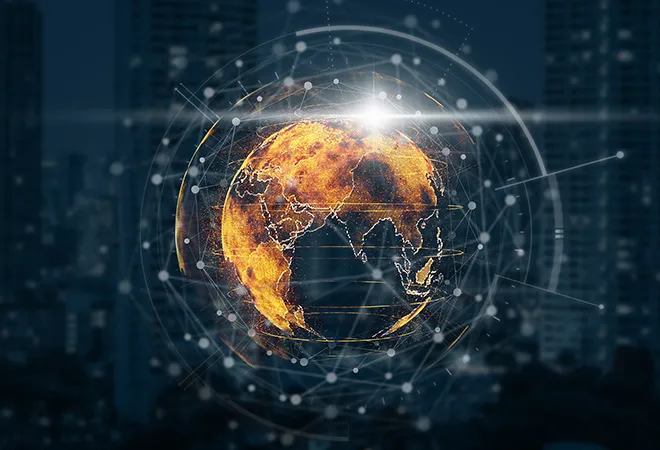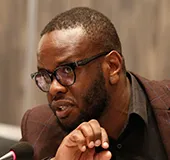-
CENTRES
Progammes & Centres
Location

While the impact of the COVID-19 pandemic has been truly global, the response to it by many governments has exposed the fine print of the social contract between many states and their citizens.
As the virus made its way from Wuhan to Washington leaving both democratic and authoritarian societies in its wake, the pandemic has underscored former UN Secretary General Kofi Annan’s message of problems without passports; challenges that transcend borders, from which no nation is immune, can address on its own or can exempt itself from risks without the benefits of international cooperation. However, the effectiveness of the response to the pandemic by different governments has shown that while the problems do not need passports, we still live in a world where the solutions desperately need them.
The rapid global spread of the pandemic was made possible by the double-edged sword of globalization that has connected disparate populations in seemingly inextricable fashion and induced panic on an unprecedented scale. Many governments hastened to stay ahead of the curve of the inevitable by adapting template prescriptions to contain the spread of the virus from hard-hit countries such as China, the United States, Italy, and France. Next to handwashing and the use of both manufactured and improvised personal protective equipment (PPE), measures such as quarantines, lockdowns and other restrictions such as social distancing were quickly fast-tracked by governments as essential measures to prevent certain death and destruction and supplemented by emergency-style restrictions on movement such as curfews.
However, despite the grand narratives on the destabilizing effects of the pandemic, the impact and the path to recovery has been differentiated. It has simultaneously posed grave crises for many countries as well as creating opportunities and openings for building back better- the catchphrase increasingly gaining traction among civil society.
The pandemic has triggered a global triple crisis with varying levels of severity in public health, socio-economic and human rights crises. It has also exacerbated some challenges to the global human rights environment that was already under threat from populism and disengagement on human rights. As a result of which, global power competition was highlighted by the spectacular failure of the United Nations Security Council to pass a resolution as the US and China squared off with the World Health Organization left in the proverbial no man’s land. It has also elicited apprehension by global civil society on what the new normal will look like with one eye warily cast to how the world was one day for civil liberties and then different the next after September 11, 2001. And just when many thought the disruptions would subside, the murder of George Floyd in Minneapolis has ignited a global outpouring of rage that has taken the fight to the literal doorstep of the world’s most powerful man. While the pandemic had disrupted the activities and progress of civil and protest movements in many parts of the world, few would have predicted headlines of the running battles between protestors and police at the fence of the White House.
Even as the world now moves towards re-opening with the worst of the pandemic hopefully in the rear-view mirror, the adverse effects are likely to linger for most of 2020. While the coming months will provide for many governments, both in isolation and collectively, a chance to review their second quarter scorecards, it also provides opportunities to build back better for many if the lessons from January to date can be logged for learning.
As Tolstoy’s opening in Anna Karenina posits, “Happy families are all alike; every unhappy family is unhappy in its own way”. The pandemic has been a stress test for many governments and has exposed in sharp contrast the sections of the social contract that need to be reviewed. It has demonstrated that respect for human rights is an effective public health strategy and that we are only as healthy as the least healthy in society. As a brief analogous and anecdotal illustration, governments that usually rank high on indices, such press freedom, access to information, corruption perception and even OECD’s Better Life index have fared comparatively better in dealing with the crisis. While the US and UK have been searching frantically for safe solutions to reopening their economies, countries that perennially cluster around the top of these indices such as Denmark, Norway, Finland and New Zealand (with the exception of Sweden) are in advanced stages of relaxing restrictions. Sporting activities have already resumed in some countries such as Germany while New Zealand announced this week that crowds would be allowed to watch upcoming rugby games. While these comparisons are of course not conclusive, parallels can yet be drawn.
On global governance, the pandemic also provides an opportunity to strengthen multilateralism by exposing the deficiencies of great power configurations such as the UN Security Council. Gripped this time by US intransigence over its rivalry with China and disdain for the WHO, the US blocked support for what may have considered a bare minimum; the global ceasefire championed by the UN Secretary General Antonio Guterres that would have provided much needed respite for civilians in war zones. This not only adds to the long list the champions of UN reform have been compiling but also provides impetus for leadership from institutions that are willing to support, adopt and champion multilateral solutions to crises free of great power competition and rivalry.
The pandemic has also visibly catalyzed national solidarity in many countries and demonstrated that the risk faced by the most vulnerable can no longer be ignored. Health for one is is health for all. Going forward, the strategies and investments that have been made to combat COVID-19 can also be applied to other communicable diseases such as Cholera whose outbreaks spread like wildfire in the developing world. The need for social welfare nets to cushion the most vulnerable has never been more apparent as unemployment rates soar in the wake of the virus. The most effective responses to the crisis in different parts of the world are being led by local actors such as health workers, volunteers, faith -based groups, youth groups and peacebuilders in conflict and post conflict situations such as South Sudan and Yemen.
The challenge in the post-COVID era will be to explore how to infuse the positive sentiment, emotion, and engagement at domestic level to inspire similar multilateral initiatives. Public displays of solidarity for health workers at the frontline of combating the spread of the virus has bridged partisan divides in many countries. Similarly, efforts to combat the spread of the virus in population-dense informal settlements and refugee or displaced persons camps where social distancing is a luxury for many will require investment in the capabilities of local actors with access to, credibility and experience in working with vulnerable communities as opposed to intervention-style and programmatic charity work.
The views expressed above belong to the author(s). ORF research and analyses now available on Telegram! Click here to access our curated content — blogs, longforms and interviews.

Davis Makori works at Crisis Action and is the Chairman of the Board at Deaf Media Kenya. He has experience working on the protection of ...
Read More +